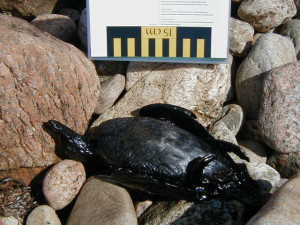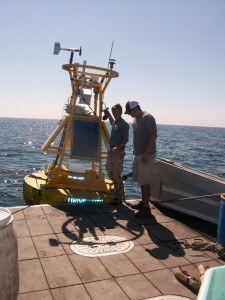We have much more to do and your continued support is needed now more than ever.
Charting a Clean Energy Future for New England’s Oil-Menaced Southeastern Coast

The National Wildlife Federation is joining the fight for offshore wind energy because we know the climate crisis is the biggest threat to America’s wildlife this century. Properly-sited, responsibly-developed offshore wind can cut our dependence on the dirty fuels that menace wildlife in its production, burning, and most visibly, in its transportation.
A Near-Miss & a Direct Hit
America’s 3rd-largest oil spill on record happened off Nantucket in 1976 when the tanker Argo Merchant ran aground, dumping 7.7 million gallons of fuel oil. Only favorable currents and weather conditions saved the New England coast from a horrific disaster, pushing the oil away from both the coast and key fishing grounds.
The area couldn’t avoid danger a second time in 2003, when the Bouchard 120 barge carrying oil for electricity generation ran aground off Buzzards Bay. It spilled 98,000 gallons of an especially thick, heavy type of oil, fouling fishing grounds for years to come, hurting an area already suffering from high unemployment. But the impacts on birds were even more severe. Hundreds of birds, many of them endangered, were killed in the spill.
“One species that was devastated by the spill was piping plovers, small shorebirds that breed along the Atlantic Coast on sand and gravel beaches,” reported Ariel Wittenberg of the New Bedford Standard Times on the recent 10th anniversary of the spill. “The birds were already endangered before the spill coated 85 percent of the Massachusetts population with oil. The spill also doubled the number of plover eggs that did not hatch that year.”
Far from rare events, oil spills are tragically common.

Turning to Clean Energy Solutions
Today, two projects in this same region are aiming to become America’s first offshore wind energy developments. Cape Wind is hoping to begin construction in a matter of months between Cape Cod, Martha’s Vineyard and Nantucket. Meanwhile, Deepwater Wind is looking to build several turbines off Rhode Island’s Block Island, which currently gets its electricity from diesel oil. Not only would the projects slash pollution and create hundreds of local jobs, but Block Island would see drastically lower electricity rates.
Polluters aren’t going down without a fight. William Koch, heir to a fossil fuel fortune and owner of Cape Cod estates, is one of several coal and oil barons pouring millions into stopping offshore wind energy.
That’s why the National Wildlife Federation is speaking up for wildlife. Catherine Bowes, the National Wildlife Federation’s senior manager for new energy solutions, works to educate lawmakers in DC and up & down the Atlantic Coast on the best policies to develop wildlife-friendly offshore wind. As a resident of New Bedford, MA, I’ve testified at two local hearings in support of offshore wind. NWF has teamed up with dozens of national, state & local conservation groups to release our Turning Point report and partnered with offshore wind developers to protect endangered right whales.
Hope for the Future
A letter to the editor from New Bedford’s Allan Duarte on the anniversary of the Bouchard 120 spill summed up the case for New England clean energy:
I hope everyone in opposition to possible future wind farms and solar farms read the “Black Monday” story over and over and realize in their heart and mind that wind and solar farms will mean greener and better future for our children and grand children. I hope they read and realize that an oil spill can take place again anytime, anyplace. The longer we stay depending on oil, the more disasters we must face.
Some worry about spoiling the scenery from solar panels around them, while others study long-term effects from wind turbines. None could compare at all to the long-term effects such as the Bouchard oil spill.
We just don’t get it, do we? To get something in return, we must give something. With wind and solar farms as a solution, we won’t be giving up very much in comparison to oil tankers in the horizon, or smoke stacks in the sky. I would rather see solar panels in the fields, and wind turbines in the sky. Makes so much more sense.
The National Wildlife Federation will keep fighting polluters and we need your help to do it. If you live in southeastern New England, sign up to testify at a local hearing on offshore wind.
![]() Donate today and help NWF continue to fight for wildlife-friendly clean energy
Donate today and help NWF continue to fight for wildlife-friendly clean energy






















